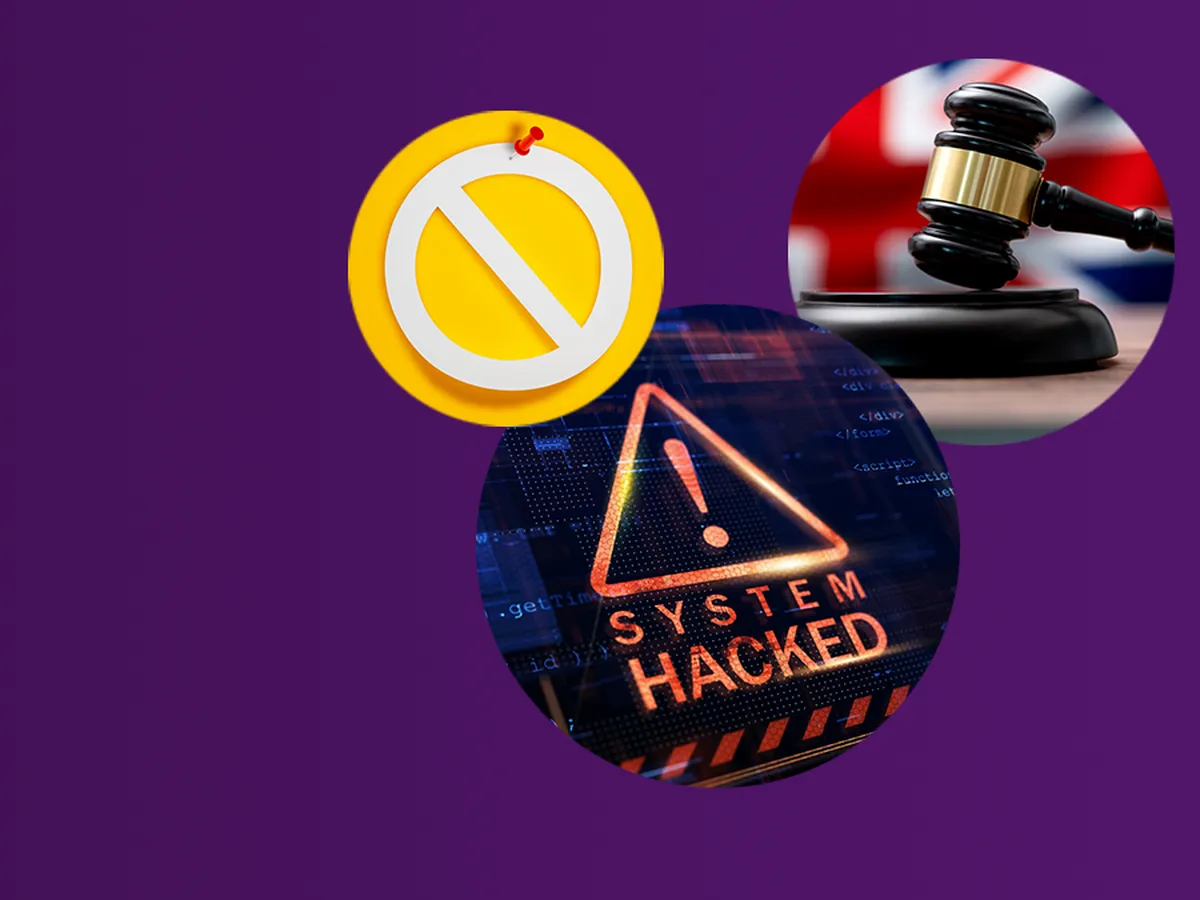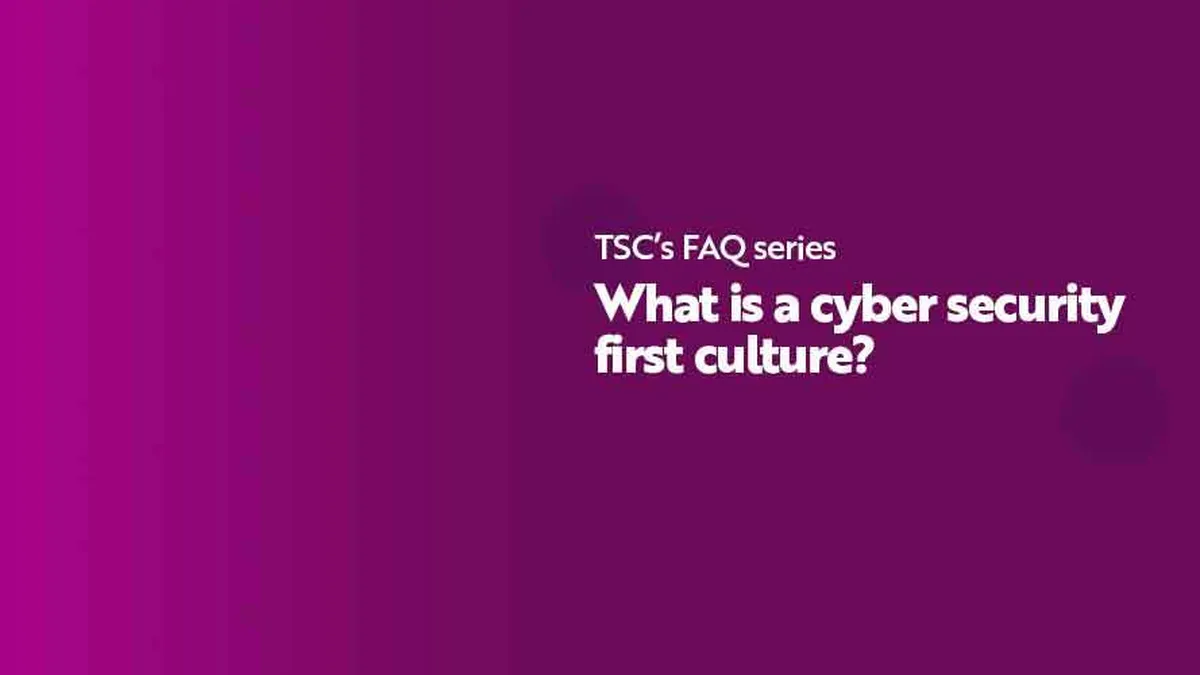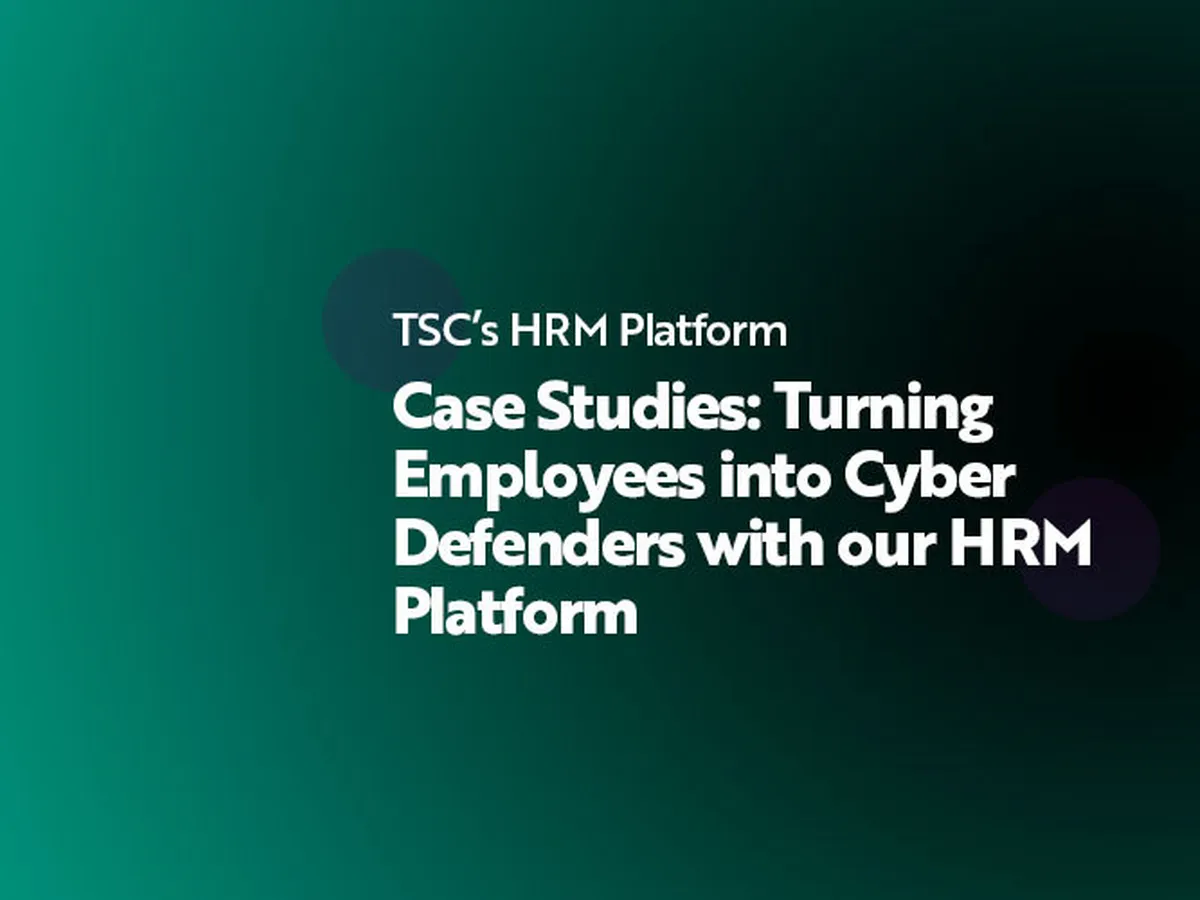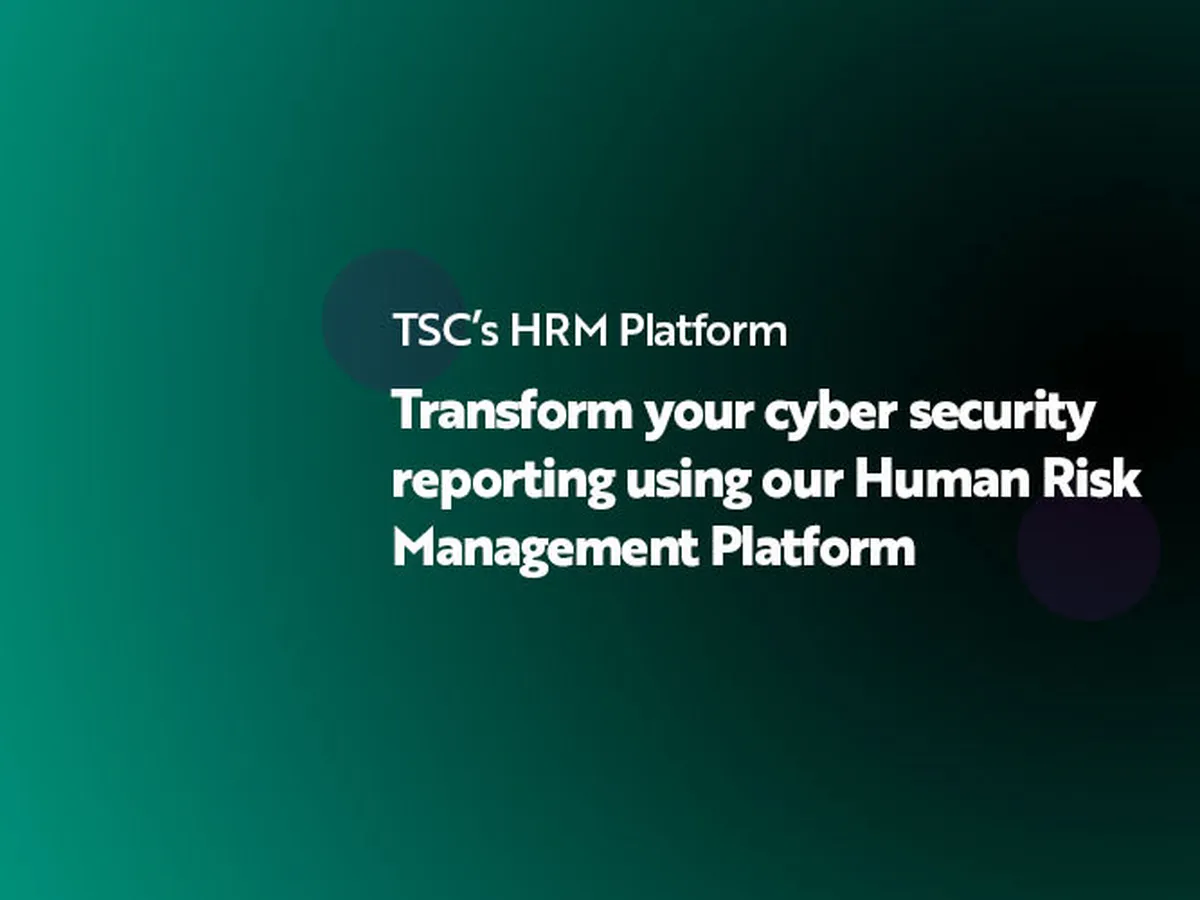
- Ransomware
- 8 min read

In 2023, the prevalence of cyber threats and the emergence of AI supercharged threats demands a proactive approach to cyber security.
A "cyber security-first culture" goes beyond simple employee awareness and knowledge development and empowers organisations to create a unified front against cyber threats. Essentially, a cyber security first culture consists of engaged and active cyber security champions rather than passive employees who only become security advocates once a year for compliance.
In this article, we explore the essence of a cyber security-first culture, highlighting the role of cyber security champions, C-suite executive buy-in, behavioural surveys, and the importance of meeting cyber security regulations and compliance standards.
A cyber security-first culture is an organisational mindset where security awareness is ingrained into every aspect of an organisation's operations and at every level. It entails fostering an environment where all employees, from top executives to frontline and entry-level staff, actively prioritise and contribute to cyber security efforts – going as far as to be labelled as security champions.
Cyber security champions are individuals within an organisation who passionately advocate for cyber security best practices. These champions serve as role models, motivating their peers to be vigilant and proactive in safeguarding digital assets. Cyber security champions do not necessarily have to reside in the C-suite. They can be any respected individual who other employees see as a role model or point of respect. A Long-serving employee, the go-to smarty pants everyone loves or even the brand new hire who has a passion for cyber security – anyone can be a cyber security champion. Having a competent and supportive voice at the employee level is a must for fostering a cyber security-first culture.
The Bandura's Social Learning Theory suggests that people learn from observing others. Cyber security champions, through their actions and commitment, inspire others to emulate secure behaviours.
For a cyber security-first culture to flourish, the active involvement of C-suite executives is essential. When top-level management prioritises cyber security, it signals the significance of cyber security and awareness of threats to the entire organisation.
The Elaboration Likelihood Model (ELM) highlights that employees may change their attitudes when presented with influential cues from authoritative figures. C-suite executives advocating cyber security will foster a positive attitude towards security. Who are employees trying to please and impress at work? More often than not, the answer is the boss. If you reflect your bosses’ behaviours, you are acknowledging your respect for them and highlighting your endeavour for personal development. It is only right that c-suite executives and board members encourage the adoption of safe behaviours by displaying it themselves.
Conducting behavioural surveys (Like TSC’s SABR) helps gauge the organisation's cyber security readiness and identify areas for improvement by pinpointing gaps. By understanding employee attitudes and perceptions, organisations can tailor their training programs effectively by targeting specific departments and roles with materials aimed at precise risks and security gaps.
The Theory of Planned Behaviour (TPB) suggests that behavioural intentions are influenced by attitudes, subjective norms, and perceived behavioural control. Our Security Awareness and Behavioural Research tool taps into these elements, finds areas in need of improvement, suggests ways to improve and positions materials and learning to support your programme in achieving meaningful change.
According to IBM and Ponemon Institute’s 2023 Cost of a Data Breach report, the average cost of a data breach has reached a record high of $4.45 million, an increase of 2% compared to 2022 ($ 4.35 million). A cyber security-first culture must align with regulatory requirements and compliance standards … unless you want to add to the yearly breach cost average and fall victim to financial and reputational damage. Compliance laws not only protects the organisation from penalties but also provides a strong and healthy security baseline for you to set and then build off from.
The Regulatory Focus Theory (RFT) suggests that individuals have either a prevention-focused or promotion-focused mindset. A culture of compliance appeals to the prevention-focused individuals, emphasising risk avoidance, whilst those that are more promotion-focused are already supported and addressed with board engagement and role model policies.
Q: What is the significance of a cyber security-first culture for an organisation?
A: A cyber security-first culture is vital as it fosters a proactive approach to cyber security across all levels of the organisation. It empowers employees to become vigilant defenders against cyber threats, reducing the risk of successful cyber attacks. A strong security culture also enhances the organisation's reputation, customer trust, and compliance standing – customers respect organisations that respect cyber security.
Q: How can cyber security champions drive the adoption of a cyber security-first culture?
A: Cyber security champions play a pivotal role in promoting secure behaviours and best practices throughout the organisation. They serve as influencers and educators, leading by example and motivating their peers to prioritise cyber security. Their advocacy encourages a culture of continuous learning and improvement.
Q: How can C-suite executives contribute to creating a cyber security-first culture?
A: C-suite executives set the tone for the entire organisation – not just for cyber security. By actively advocating for cyber security and demonstrating their commitment to it, they send a powerful message to employees about its importance. Their support is usually in conjunction with financial buy-in and support which also ensures that adequate resources and attention are allocated to cyber security initiatives and the biggest threats your organisation faces.
Q: What benefits do behavioural surveys bring to fostering a cyber security-first culture?
A: Behavioural surveys provide valuable insights into employee attitudes, knowledge, and understanding of cyber security. These surveys help identify areas where the organisation may be vulnerable to cyber threats due to human error or lack of awareness within the organisation. These surveys will then recommend ways of addressing these gaps with targeted training programs and interventions. External behavioural surveys are also absent of any internal bias; they only tell the truth and provide great quantitative data when reflecting on your yearly awareness and training results.
Q: Can a cyber security-first culture prevent all cyber incidents?
A: While a cyber security-first culture significantly reduces the risk of cyber incidents, no strategy can truly guarantee complete immunity. Cyber threats continue to evolve, and attackers may find new avenues to exploit. However, a strong security culture, coupled with robust technical defences, forms a formidable defence against cyber threats and mitigates their impact. Furthermore, a cyber security-first culture encourages your employees to be active with their cyber security development; they will seek out and naturally learn about emerging threats, hopefully before you assign them compulsory learning on the topic.
Q: How can organisations sustain a cyber security-first culture in the long term?
A: Sustaining a cyber security-first culture requires continuous commitment and reinforcement. Organisations can achieve this through regular training and awareness programs, incentivising secure behaviours, acknowledging cyber security champions, and incorporating cyber security into consistent performance evaluations. Regular communication and updates about the latest threats and best practices also play a crucial role in maintaining a security-conscious culture. Working with a tried and tested cyber security partner like TSC will allow you to share your cyber security concerns with experts in the space.
A cyber security-first culture is not merely an abstract idea or buzzword; it is a dynamic and powerful strategy to combat cyber threats with long-term thinking at its core.
By nurturing cyber security champions, securing C-suite executive buy-in, conducting behavioural surveys to plug security gaps, and prioritising compliance-based policies, organisations can forge a formidable defence against threat actors.
Embracing a cyber security-first culture is not just a choice; it is a necessity in the digital age, ensuring that every member of the organisation plays an active role in safeguarding its digital future because cyber criminals do not discriminate – they will look for any vulnerability prime for exploitation and a backdoor into finances and data.
If you would like information about how The Security Company can help you to formulate a cyber security training and awareness program for your organisation and how we help support security leaders in setting up a fresh cyber security awareness framework ... please contact our Head of Business Development and Sales, Jenny Mandley.
The Security Company's vast library of customised and non-customised products and services are tailored for small, medium and large organisations and are available in a variety of languages. We also offer bespoke solutions for organisations that desire training and awareness materials built from the ground up.



© The Security Company (International) Limited 2025
Office One, 1 Coldbath Square, London, EC1R 5HL, UK
Company registration No: 3703393
VAT No: 385 8337 51


